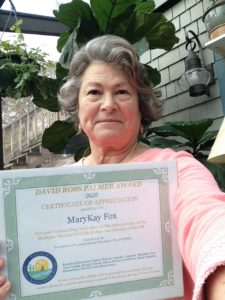DRP 2020 Environmental Hero: MaryKay Fox

At its Annual Meeting on November 10, 2020, the Friends of Mashpee National Wildlife Refuge (MNWR) presented the organization’s 2020 David Ross Palmer Environmental Hero Award to MaryKay Fox of Falmouth, MA. Since 2013, the DRP Award has been bestowed on community leaders who demonstrate outstanding dedication and excellent stewardship and conservation work within the Mashpee National Wildlife Refuge.
MaryKay has been on the Board of Directors of the Friends of MNWR since 2004, served as its President from 2011 through 2018, and is currently Treasurer of the Friends organization. Throughout her professional career, along with a dedication to volunteerism and personal example, MaryKay has been an advocate for wildlife, from sea turtles to pollinators.
MaryKay came to the Cape in 1999 from Minnesota to work at the Marine Biological Laboratory (MBL) Ecosystem’s Center after finishing her BS in Fish and Wildlife Management and Masters in Water Resources. MaryKay completed her working career at the Waquoit Bay National Estuarine Research Reserve, retiring in 2013.
In recent years as a volunteer, MaryKay has been instrumental in securing and managing local environmental grants, including one from the U.S. Fish & Wildlife Partners Program for Monarch Butterfly Habitat, and two grants from the Town of Mashpee CPA Committee to produce MNWR trail guides and a history book on the Mashpee Refuge.
In an email interview, when asked about what the Palmer award meant to her personally, MaryKay responded, “I was overwhelmingly pleased to be awarded the DRP award. Although I don’t think of myself as an environmental hero, and who does, it was quite the surprise and honor to be acknowledged for the time, effort, and energy I’ve donated to the Friends organization and advocacy for the Refuge and its partnerships over the years.”
MaryKay went on to express her hope that each of us should constantly evaluate our impact on the earth, from our food choices to awareness of packaging to demands on limited resources. “In reality, there is only one earth that supports everyone and every wild thing, plant, animal or microbes, so every resource is limited, especially as our human population keeps growing,” she explained.
“What can I do to help nature or wildlife and have a softer daily impact on the earth?” MaryKay asks of herself. But she doesn’t stop at talking about it, or even asking the difficult questions; she brings this “simpler is better” mantra into her personal life. She and her husband try to grow most of their own vegetables, raise chickens for eggs, and exchange their excess garden produce with neighbors and food banks, all while sharing ideas and initiatives to collectively reduce their carbon footprints. As MaryKay describes some of her efforts:
“I found a store that sells milk in recycled glass jars, I bought meat from the deli and had the butcher wrap it in waxed paper to avoid the once-used plastic tray, I purchased whole fruits such as pineapple, muskmelon, watermelon, etc. and found that you can get far more to eat for less cost and waste… I’ve cut my recycled bin volume in half and contribute more to my compost pile as a result.”
MaryKay leads by example, yet often follows the examples of others. “If they make it a priority, I’ll give it a try” she emphasized.
Gardening is also a passion as well as an endless learning opportunity for MaryKay, demonstrated by her hands-on efforts to plant native flowering plants, where she observes the increase in bee species and other native insects for months and years after planting. She quotes the Audrey Hepburn line that “to plant a garden is to believe in tomorrow.”
MaryKay challenges us all to “be that person that leads by example.” She continues: “If people see you trying to make a change in your little corner of the world, they might take home some aspect that appeals to them… a small step at first, then other steps that spread outward, possibly throughout the community and beyond.” As she describes it, “spending time outside is calming, give us time to reflect, think, plan, which is better for our physical and mental well-being.”
MaryKay was humbled to receive the David Ross Palmer Award, and honored to be associated with past conservationist recipients: the late Mary Scanlan, Gerry Studds and George Costa, as well as Beverly Kane, Janice Walford, Chuckie Green, Christine Gault, Carl Melberg, Mary Varteresian, Tom Fudala, Mark Forest and Ed Moses.
“You can only achieve your goals if you stay focused on what is important, love what you’re doing and, importantly, be surrounded by like-minded and supportive folks,” MaryKay avowed.
The Friends of Mashpee National Wildlife Refuge express their deep appreciation to MaryKay, for her dedication and example. Imagine a world where we all strive to be environmental heroes!
